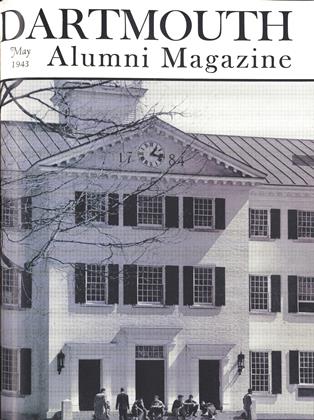ASI HAVE READ a good many books that I want to recommend since I last wrote this column I shall make the reviews brief and to the point.
Many of you must have seen Noel Coward's moving story of the life and death of a British destroyer (said to be based on Mountbatten's career as an active officer of a destroyer) in the picture In Which WeServe. Macmillan has published a book by a Lt. John Fernald giving in fictional form the story of one of the fifty destroyers we turned over to England when she needed them the most. This book Destroyer FromAmerica tells of the extraordinary heroism demanded as an everyday thing from the crews of ships which shepherd convoys between dangerous ports and along sea lanes where submarines lurk in "packs" ready to win the war for Schickelgruber. The book is well done, as Coward's picture was well done.
Dr. Fred H. Albee, performer of more than thirty thousand operations, has written his autobiography A Surgeon's Fight toRebuild Men (Dutton, 1943). Dr. Albee used to watch his grandfather taking infinite pains in grafting fruit trees; years later the surgeon used the same technique in bonegrafting on humans. There is little doubt that many men are walking today who would have been hopeless cripples had not Dr. Albee applied his technique developed through many years between consultations and travel, between studies and teaching others. He is not one to hide his light under a bushel, but his light is one that should not be hidden. Dr. Albee is the kind of man whose presence is felt within a radius of several square miles. You'll feel it, too, if you read this informative and interesting book.
A book to delight any craftsman, any lover of the countryside (particularly the English countryside), and any lover of good literature is Walter Rose's GoodNeighbours, published by Macmillan through the Cambridge University Press. Take my word for it: this, and his other book, 7'he Village Carpenter, will take you a long way from the war to a world that in its fundamental principles will return, as these principles are ageless and eternal. A classic in its genre. Well illustrated and printed, the American edition is superior in bookmaking, etc., to the English edition. $2.75, and more than worth it.
I have no intention of reviewing Alexander Laing's Way for America, which was ably reviewed by a colleague a month ago. However, it may be recommended to those who can agree, and we all should, with his democratic thesis: "The commonplace wisdom of ordinary men and women is the democratic force which directs the knowledge of their expert representatives, in every field of endeavor, but in politics and statesmanship first of all," and "The plain wisdom of the people originates in a moral ability to look past impermanent technicalities into the enduring aspects of every proposal and to make up their minds whether, in the long run, it will prove to be good or evil."
Laing writes in the tradition of Whitman and Jefferson and puts his case well. Much of the material you may be familiar with if you have read the books which have gone over the mistakes of the Allied statesmen for the past ten years, and I, for one, wish Mr. Laing had written a shorter book with his thesis boiled down, pared to the bone, etc., in order to reach a wide audience for what he says is important.
Theodore Pratt's Mr. Winkle Goes toWar and Berry Fleming's Colonel Effingham's Raid have the light touch.
John Hersey's Into the Valley, Richard Tregaskis' Guadalcanal Diary, and Ira Wolfert's Battle for the Solomons will give you the story of how we took an island from the Japs. This action (Coral Sea) was "the first battle in the history of modern war that could be viewed in its entirety by a single man standing still." This statement refers to the Japs' "skillful, tenacious, heedlessly bloody attempt to reduce permanently our Guadalcanal salient by wiping out its sea power and obliterating its garrison of planes and men." In this attempt the Japs lost 28 ships sunk, including 2 battleships, plus 10 damaged. We lost 7 destroyers and 2 light cruisers. Guadalcanal is described by veterans of bushfighting in Central America, of Bellau Wood and the Argonne, as the most difficult terrain that any army ever fought over.
 View Full Issue
View Full Issue
More From This Issue
-
 Lettter from the Editor
Lettter from the Editor'Round the Girdled Earth
May 1943 -
 Article
ArticleTHE LIBERAL ARTS COLLEGE
May 1943 By W. H. COWLEY '24 -
 Article
ArticleBrief Biographies of Buildings
May 1943 By LEON BURR RICHARDSON '00 -
 Article
ArticleFrom the Mailbag
May 1943 -
 Class Notes
Class Notes1937
May 1943 By JOHN H. DEVLIN JR., FREDERICK K. CASTLE -
 Class Notes
Class Notes1918
May 1943 By ERNEST H. EARLEY, RICHARD A. HOLTON
HERBERT F. WEST '22
-
 Article
ArticleHANOVER BROWSING
January 1936 By Herbert F. West '22 -
 Article
ArticleHANOVER BROWSING
March 1936 By Herbert F. West '22 -
 Article
ArticleHanover Browsing
March 1944 By HERBERT F. WEST '22 -
 Books
BooksDON'T COME CRYING TO ME.
February 1955 By HERBERT F. WEST '22 -
 Article
ArticleHanover Browsing
October 1951 By HERBERT F. WEST '22 -
 Books
BooksPREPOSTEROUS PAPA.
January 1960 By HERBERT F. WEST '22








